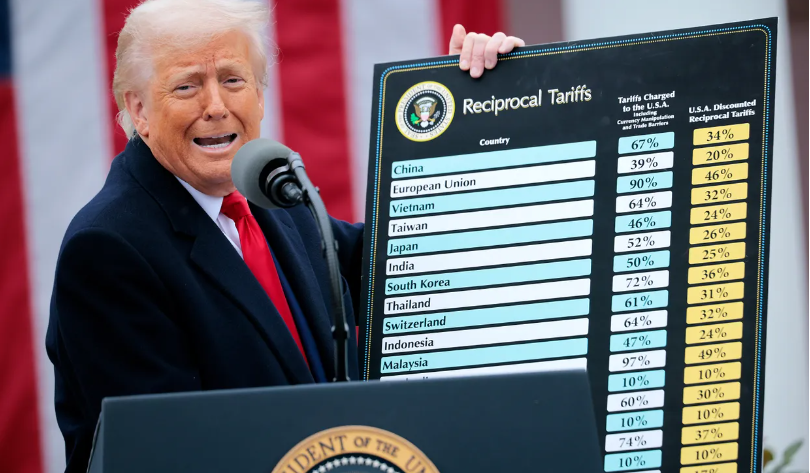
Global Trade and Economy: The Impact of U.S. Tariffs
U.S. Imposes Sweeping Tariffs
President Donald Trump has introduced significant tariffs on foreign imports, marking a major shift in U.S. trade policy. The new measures include a universal 10% tariff on all imports, with steeper levies imposed on key trading partners: 54% on Chinese goods, 20% on European Union (EU) products, and 24% on Japanese imports. This decision has sent shockwaves through global financial markets, with U.S. stock futures dropping sharply and raising concerns about a full-scale trade war.
Economic and Market Reactions
The announcement has led to widespread market volatility, as investors brace for retaliatory measures from affected nations. A sharp decline in U.S. stock futures signals uncertainty among businesses and investors who fear the tariffs will lead to increased costs, reduced corporate profits, and potential disruptions in supply chains.
Stock Market Decline: Major indexes, including the S&P 500, Dow Jones, and Nasdaq, have seen significant drops in futures trading, reflecting investor anxiety.
Currency Fluctuations: The U.S. dollar, Chinese yuan, and euro are experiencing turbulence as traders assess the potential impact on international trade flows.
Business Concerns: American companies reliant on imported materials—such as manufacturers, retailers, and tech firms—anticipate rising costs, which could be passed on to consumers.
Global Trade Tensions Escalate
The aggressive tariff strategy has already prompted strong reactions from trading partners:
China: Expected to retaliate with its own tariffs on U.S. goods, particularly in the agriculture and technology sectors.
European Union: Has hinted at countermeasures targeting American exports such as automobiles, whiskey, and agricultural products.
Japan: Likely to respond with trade restrictions of its own, potentially affecting U.S. exports like machinery and electronics.
Potential Economic Consequences
If these tariffs remain in place or escalate further, several key consequences may unfold:
Higher Consumer Prices: American consumers may face increased costs for everyday goods, as importers pass tariff expenses onto buyers.
Supply Chain Disruptions: Companies dependent on global supply networks, including Apple, Tesla, and Boeing, could struggle with cost hikes and delays.
Retaliatory Tariffs: Countries affected by the U.S. tariffs may impose their own, hurting American exports and manufacturing jobs.
Slowdown in Global Growth: Trade restrictions could weaken economic growth worldwide, particularly in China, Europe, and emerging markets.
Geopolitical and Long-Term Effects
This tariff policy could have long-lasting geopolitical effects, influencing U.S.-China relations, transatlantic partnerships, and global trade alliances. If tensions escalate, it may lead to a restructuring of global trade dynamics, with countries seeking alternative partners to reduce dependence on U.S. markets.
Author: Global Ripple
Posted on: April 03, 2025
 Global Ripple
Global Ripple